Karyon - Study guides, Class notes & Summaries
Looking for the best study guides, study notes and summaries about Karyon? On this page you'll find 10 study documents about Karyon.
All 10 results
Sort by
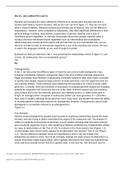
-
Bis 2C, Pre-Lab 2 (Graded A+)
- Exam (elaborations) • 9 pages • 2023
-
Available in package deal
-
- $7.99
- 2x sold
- + learn more
Bis 2C, Pre-Lab #2 Bacteria and Archaea are often collectively referred to as prokaryotes because they lack a nucleus (pro=before, karyon=nucleus). But, as you can see from figure 2.1, they are not each other’s closest relatives. Because bacteria and archaea are so diverse, they can be difficult to characterize. However, when compared to eukaryotes, they have significant differences in their general biology including, reproduction, organization of genetic material, and a lack of membrane...
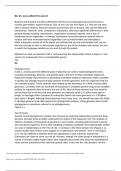
-
BIS 2C Pre lab 2: Introduction to Bacterial and Archaeal Diversity (Graded A+)
- Exam (elaborations) • 9 pages • 2023
-
Available in package deal
-
- $8.99
- + learn more
Bacteria and Archaea are often collectively referred to as prokaryotes because they lack a nucleus (pro=before, karyon=nucleus). But, as you can see from figure 2.1, they are not each other’s closest relatives. Because bacteria and archaea are so diverse, they can be difficult to characterize. However, when compared to eukaryotes, they have significant differences in their general biology including, reproduction, organization of genetic material, and a lack of membrane-bound organelles. I...
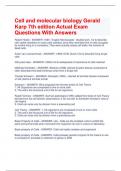
-
Cell and molecular biology Gerald Karp 7th edition Actual Exam Questions With Answers
- Exam (elaborations) • 5 pages • 2023
-
Available in package deal
-
- $9.49
- + learn more
Cell and molecular biology Gerald Karp 7th edition Actual Exam Questions With Answers Robert Hooke - ANSWER- 1665 - English Microscopist - Studied cork. 1st to describe cell; called chambers in corks cells (cellular) since they reminded him of cells occupied by monks living in a monastery; They were actually empty cell walls, the remains of dead cells. Anton van Leeuwenhoek - ANSWER- () Dutch; first to describe living single cells 200 years later - ANSWER- 1830s Full & widespread of imp...
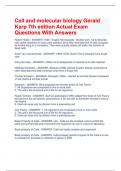
-
Cell and molecular biology Gerald Karp 7th edition Actual Exam Questions With Answers
- Exam (elaborations) • 5 pages • 2023
-
- $10.49
- + learn more
Cell and molecular biology Gerald Karp 7th edition Actual Exam Questions With Answers Robert Hooke - ANSWER- 1665 - English Microscopist - Studied cork. 1st to describe cell; called chambers in corks cells (cellular) since they reminded him of cells occupied by monks living in a monastery; They were actually empty cell walls, the remains of dead cells. Anton van Leeuwenhoek - ANSWER- () Dutch; first to describe living single cells 200 years later - ANSWER- 1830s Full & widespread ...
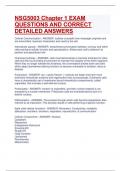
-
NSG5003 Chapter 1 EXAM QUESTIONS AND CORRECT DETAILED ANSWERS
- Exam (elaborations) • 13 pages • 2023
-
Available in package deal
-
- $11.99
- + learn more
NSG5003 Chapter 1 EXAM QUESTIONS AND CORRECT DETAILED ANSWERS Cellular Communication - ANSWER- (cellular crosstalk) how messages originate and are transmitted, received, interpreted, and used by the cell. Intercellular signals - ANSWER- streamlined conversation between, among, and within cells maintains cellular function and specialization. Allows each cell to determin its position and specialized role. Chemical fondness - ANSWER- cells must demonstrate a chemical fondness for other cel...

-
WGU - C190 EXAM |68 QUESTIONS WITH 100% CORRECT ANSWERS.
- Exam (elaborations) • 8 pages • 2023
- Available in package deal
-
- $15.99
- + learn more
Coevolution Event The process by which two or more species evolve in tandem by exerting selection pressures on each other Speciation Event A lineage-splitting event that produces two or more separate species. Phylogenetic Event The evolutionary development and history of a species or higher taxonomic grouping of organisms. Also called phylogenesis. The evolutionary development of an organ or other part of an organism Homology Event Shared trait among species Mutat...
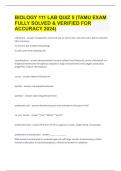
-
BIOLOGY 111 LAB QUIZ 5 (TAMU EXAM FULLY SOLVED & VERIFIED FOR ACCURACY 2024)
- Exam (elaborations) • 5 pages • 2023
-
- $15.49
- + learn more
cell theory 1) organisms consist of one or more cells, and each cell is able to maintain life's processes 2) cells are the smallest living things 3) cells come from existing cells cyanobacteria photosynthetic bacteria (oldest fossil bacteria), carries chlorophyll a in thylakoid membranes throughout cytoplasm; huge environmental role (oxygen production, progenitor of plant chloroplasts) Brainpower Read More Previous Play Next Rewind 10 seconds Move forward 10 seconds U...
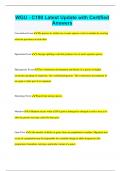
-
WGU - C190 Latest Update with Certified Answers
- Exam (elaborations) • 13 pages • 2023
-
Available in package deal
-
- $9.99
- + learn more
WGU - C190 Latest Update with Certified Answers Coevolution Event The process by which two or more species evolve in tandem by exerting selection pressures on each other Speciation Event A lineage-splitting event that produces two or more separate species. Phylogenetic Event The evolutionary development and history of a species or higher taxonomic grouping of organisms. Also called phylogenesis. The evolutionary development of an organ or other part of an organism Homology Event Shared trait ...

-
Cell and molecular biology Gerald Karp 7th edition Actual Exam Questions With Answers
- Exam (elaborations) • 5 pages • 2024
-
- $11.99
- + learn more
Cell and molecular biology Gerald Karp 7th edition Actual Exam Questions With Answers Robert Hooke - ANSWER- 1665 - English Microscopist - Studied cork. 1st to describe cell; called chambers in corks cells (cellular) since they reminded him of cells occupied by monks living in a monastery; They were actually empty cell walls, the remains of dead cells. Anton van Leeuwenhoek - ANSWER- () Dutch; first to describe living single cells 200 years later - ANSWER- 1830s Full & widespread ...
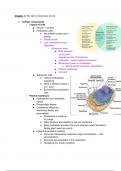
-
The cell
- Class notes • 9 pages • 2023
- Available in package deal
-
- $7.99
- + learn more
details regarding the cell biochemistry

$6.50 for your textbook summary multiplied by 100 fellow students... Do the math: that's a lot of money! Don't be a thief of your own wallet and start uploading yours now. Discover all about earning on Stuvia


